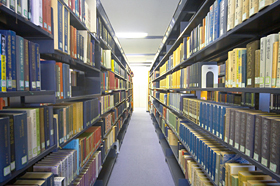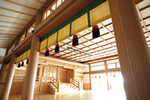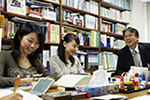
Faculty of Letters
starts with an understanding of Japan

Departments
Department of Shinto
One of the department’s distinguishing characteristics is that students can take advantage of its close proximity to the Jingu History Museum (Jingu Chokokan), which holds and displays many cultural properties; the Jingu Library, which holds important written materials related to Shinto; and Jingu, which is nearby the university campus. Graduates of the department are highly valued not only at Shinto shrines but also in the public and private sectors.

Department of Japanese Literature
The Department of Japanese Literature, which has more than 140 years of tradition and history, was born out of a desire to have students learn from the great minds of our ancestors, and the foundation of scholarship there is found in the interpretation and annotation of classical texts. In addition to Japanese literature and Japanese language, our full-time facultyʼs wide range of specializations include literature written in Classical Chinese, and Calligraphy for a total of ten fields of study. Our students are active outside of the classroom visiting the sites of masterpieces in research trips (fieldwork) and literary strolls, both of which are opportunities to deepen their understanding of Japanese literature as something that is rooted in the Japanese landscape.
One characteristic of the department is that students receive individualized guidance in a homelike atmosphere through having lectures and seminars with small class sizes. Graduates of the department, who have gained fluency in beautiful Japanese—the ability to express themselves in appropriate Japanese, are heavily relied upon in society, where they are active in a large number of fields.
◆ Japanese Language and Literature Course
◆ Japanese Language Teacher Course
◆ Calligraphy and Chinese Classical Literature Course
◆ Librarian Course

Department of Japanese History
In particular, we devote much of our effort to training students in interpreting historical materials, and many of our graduates who have gained practical competence are active at the forefront of their professions in academia and education. Our department has contributed outstanding research to a large number of sub-fields including political, legal, socio-economic, intellectual, and religious history.
◆ Historicaland Cultural property course

Department of Communication
In our global society, it is becoming increasingly important for us to use the spoken word, written word, and information technology as means of communication. It is essential to have the ability to express yourself in both Japanese and in international languages such as English, gather information, and communicate effectively. Then, what is communication? Of course, it refers to interactions among people. However, communication is also about humans mediating close interactions between people and local regions, the societies they contribute to, and the natural world around them. The spoken word, the written word, and information technology connect these interactions in complex ways, and these interactions shape society and culture in local regions. In the Department of Communication, these organic connections are understood by drawing upon several perspectives including psychology, English, information technology, cultural studies, history, religion, and regional studies in order to improve communication competency.
◆ English Communication Course
◆ English Teacher Course ◆ Psychology Course
◆ Information Technology Course







